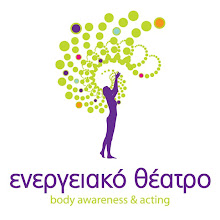It is an experiential acting training method, which combines improvisation, physical theatre, and incorporates Western body psychotherapeutic methods (among others: Wilhelm Reich’s Character Analysis – Vegetotherapy) and Eastern therapeutic techniques.
Energy Theatre aims to help the actors release blocked energy, to regain contact with the body acquiring rhythm, power and balance, to loosen emotions through appropriate exercises so as to bring out the creative potential, develop the acting ability and awareness on stage, and empower them to unfold their talent.
Depi Mavropoulou uses the participants’ body messages and blockages as a tool to transform the “problem” creatively to improve their performing abilities and the building of the character.
Energy Theatre training helps the actor to allow greater physical and emotional expression, when creating a character. In this way the actor can be more at ease to communicate creatively with the character, to consciously discover elements of one’s own personality, thus achieving greater self-awareness and emotional support in daily life. This results in better psychological mood, higher levels of energy, more harmonious co-existence with fellow actors in the team, and honest communication with the audience.
Who can participate?
Professional and amateur actors, students of drama schools or acting studios, and anyone who loves expressing themselves through the theatre.
It is highly beneficial (in improving performance and providing emotional support) as a tool for the support of theatre groups and theatrical companies in the process of preparing a show.
It can also be a valuable aid for psychology professionals (psychologists, psychotherapists, psychiatrists, speech therapists etc), teachers of all levels, coordinators of groups, social workers etc.


